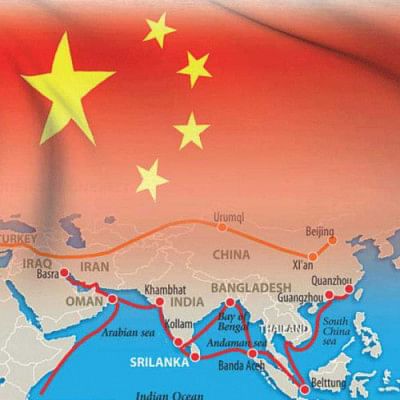How Bangladesh can be benefitted

In September and October 2013, Chinese President Xi Jinping put forward the proposal of jointly building a Silk Road Economic Belt and a 21st-Century Maritime Silk Road, popularly known as the One Belt and One Road (OBOR) initiative. OBOR links countries and regions that account for about 60 percent of the world's population and 30 percent of global GDP. From its inception, OBOR has gained sincere attention from policymakers, the academic community and other concerned stakeholders across the world. China's OBOR initiative basically seeks to economically, socially and culturally connect Asia, Europe and Africa by creating road and sea routes. In fact, Vuk Jeremic, President of the Center for International Relations and Sustainable Development, identified the initiative as "the greatest human endeavor ever to connect countries and cultures".
From May 14-15, 2017, President Xi Jinping hosted a global summit on his 'Belt and Road' initiative in Beijing, which was closely watched by the world. At the opening ceremony, Xi Jinping described the One Belt, One Road initiative as "a project of the century" that will benefit people across the world. A total of 29 foreign heads of state and government leaders attended the forum, including Russian President Vladimir Putin. Other delegates included officials, entrepreneurs, financiers and journalists from over 130 countries, and representatives of key international organisations, such as the UN Secretary-General Antonio Guterres, World Bank's President Jim Yong Kim, and Managing Director of the International Monetary Fund, Christine Lagarde. This certainly demonstrates the growing attention and acceptance of Chinese OBOR initiative globally.
A high-level delegation from Bangladesh also participated in the forum to discuss various issues like the prospects of the BCIM (Bangladesh, China, India and Myanmar) economic corridor, a key OBOR project connecting to the resourceful Indian Ocean, according to media reports. The Bangladeshi delegation also placed some other key issues at the forum, such as reducing the trade gap between the two countries and allowing duty-free access of 22 major Bangladeshi products to Chinese markets, something that Bangladesh has been requesting for several years. Bangladesh also has an opportunity to improve connectivity and transform its economic conditions by exploring new avenues through trade, investment and greater people-to-people exchanges among the OBOR countries. In addition, China is expected to invest a cumulative USD 4 trillion in OBOR countries within an unspecified time horizon (The Economist, July 2, 2016).
Bangladesh formally joined the Chinese OBOR initiative during President Xi Jinping's visit to the country in October 2016. Within the larger framework of OBOR, economic integration between Bangladesh and China is expected to grow. And China matters a lot to Bangladesh, considering the growing volume of trade along with other dimensions. Besides, cargo transport time is expected to be reduced across OBOR-aligned countries, which will positively impact on Bangladesh's trade with China.
Thus, Bangladesh, as one of the participating countries will obviously benefit from this initiative. In addition, Xi Jinping in the summit announced that China will contribute an additional 100 billion yuan (about USD 14.5 billion) to the Silk Road Fund. China will provide assistance worth 60 billion yuan in the coming three years to developing countries and international organisations participating in the Belt and Road initiative. Moreover, it has pledged to provide emergency food aid worth 2 billion yuan to developing countries along the Belt and Road, and make an additional contribution of USD 1 billion to the Assistance Fund for South-South Cooperation, 100 "happy home" projects, 100 poverty alleviation projects and 100 health care and rehabilitation projects in countries along the Belt and Road. It has also promised to set up 50 joint laboratories with countries participating in the Belt and Road Initiative to enhance cooperation on innovation.
Bangladesh has already received positive outcomes from its warm ties with China in recent times. For instance, in addition to Chinese domestic banks, the Asian Infrastructure Investment Bank (AIIB) will be an important financial source for Bangladesh's economic development needs, as witnessed by the fact that one of the first four AIIB loans was for a Bangladeshi power distribution system upgrade and expansion project (Lewis, 2016).
With regard to the question of where does Bangladesh stand in the OBOR iniative, as Donald J. Lewis, Director of the Centre for International Economic Law, Trade & Development wrote in China Daily (October 16, 2016): "[t]he land dimensions of the OBOR consist of several inter-connected corridors spanning the entire Eurasian continent. Bangladesh is centrally situated along the Bangladesh-China-India-Myanmar (BCIM) Economic Corridor. Bangladesh also occupies a strategic position along the 21st Century Maritime Silk Road with its bustling port of Chittagong as a major maritime hub through the Indian Ocean".
Finally, it is worth a note that the 21st Century will most likely be the Chinese century, as China will be leading the world in various ways. The OBOR could introduce a new era of win-win globalisation. Bangladesh needs to utilise her geographic location and harness the benefits from the OBOR initiative. Thus full cooperation with China to make this initiative successful will be a wise decision for Bangladesh, as this century is all about shared prosperity and development.
The writer is Assistant Professor of International Relations, University of Rajshahi.
Email: [email protected]

 For all latest news, follow The Daily Star's Google News channel.
For all latest news, follow The Daily Star's Google News channel. 



Comments